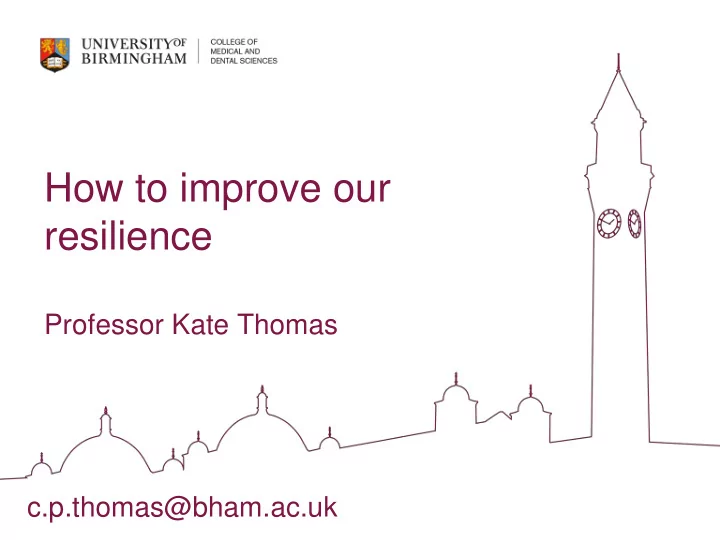

How to improve our resilience Professor Kate Thomas c.p.thomas@bham.ac.uk
What is resilience? Resilience is the process of adapting well in the face of adversity, trauma, tragedy, threats or significant sources of stress Resilience is not a trait that people either have or do not have. It involves behaviours, thoughts and actions that can be learned and developed in anyone American Psychological Association
Why aren’t young people resilient like we were/are? Some believe their success is based on innate ability; these are said to have a "fixed" theory of intelligence (fixed mindset). Some believe their success is based on hard work, learning, training and doggedness; these are said to have a "growth" or "incremental" theory of intelligence (growth mindset). Dweck C. Mindset: the new psychology of success 2008.
Faced with adversity You can: Become angry and blame everyone else Implode and be wholly negative Become upset about the disruptive change and change in order to cope Negative emotions: fear, anger, anxiety, distress, helplessness, and hopelessness decrease our ability to solve problems and weaken our resilience. Constant fears and worries affect our immune system and increase our vulnerability to illnesses .
On the benefits of failure There is an expiry date on blaming your parents for steering you in the wrong direction; the moment you are old enough to take the wheel, responsibility lies with you. I am not dull enough to suppose that because you are young, gifted and well- educated, you have never known hardship or heartbreak. Talent and intelligence never yet inoculated anyone against the caprice of the Fates. I am not going to stand here and tell you that failure is fun. That period of my life was a dark one, and I had no idea that there was going to be what the press has since represented as a kind of fairy tale resolution. Failure meant a stripping away of the inessential. I stopped pretending to myself that I was anything other than what I was, and began to direct all my energy into finishing the only work that mattered to me. Had I really succeeded at anything else, I might never have found the determination to succeed in the one arena I believed I truly belonged. www.youtube.com/watch?v=wHGqp8lz36c
Why failure is a good thing! It is only helpful feedback It enables us to learn It takes science in lots of different directions It helps us to take stock and be realistic We have to adapt and become more effective
Brace yourselves… “This paper adds nothing to the sum total of human knowledge and serves only to muddy the waters.” “This [grant] application is nothing more than the thoughtless accumulation of meaningless data.”
Becoming resilient 1 Make connections – group/peer support Avoid seeing crises as insurmountable problems Accept that change is a part of living and accept when we can’t change things Move toward your realistic goals Take decisive actions in adversity Look for opportunities for self-discovery Nurture a positive view of yourself
Becoming resilient 2 Keep things in perspective Maintain a hopeful outlook Take care of yourself Reflect and plan actions American Psychological Association Mindfulness, meditation, yoga, Headspace ™ Thomas’s second law: don’t put your life on social media for all to see
Recommend
More recommend